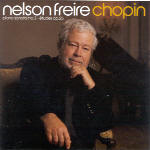On his first release under contract to Decca, Nelson Freire revisits Chopin’s B minor sonata, one of his finest youthful recorded achievements. Comparisons between Freire’s 1968 Columbia Masterworks traversal (reissued in Philips’ Great Pianists of the 20th Century series) and the present release reveal fascinating similarities and differences. Freire still retains a fondness for highlighting inner voices and bass lines, but in the context of a broader, more sweeping style. The Scherzo’s quicksilver filigree, for instance, boasts more lightness, ease, and scintillation than before, while the first movement’s dense polyphony proves no less clear by way of Freire’s more headlong shaping. Many pianists fuss with the slow movement’s seemingly endless triplet figures in the name of “interpretation”, consequently putting their audiences to sleep. Not Freire, who relegates these figures to a steady background perspective while focusing instead on longer melodic lines. The Finale gets off to a powerful, assured start, yet the energy flags under Freire’s rhetorical brush strokes and increasing preoccupation with the crowded left-hand patterns. As a result, the basic pulse winds up having slowed down by the time the main theme returns.
Several selections easily stand out among the Op. 25 Etudes. Freire transforms the B minor “Octave” Etude from the wrist exercise it often is to a veritable tone poem and takes special care to bring equal dynamic heft to the left hand. Freire similarly throws mechanics to the wind in the Etudes in Thirds and Sixths, concentrating on character and color; the brisk, torrential, and jaw-droppingly effortless “Winter Wind” fuses Josef Lhevinne’s diamond-cut brilliance and Van Cliburn’s poetry. Yet the F major and E minor etudes don’t quite flow under the weight of Freire’s fustian detailing. In the “Aeolian Harp” Etude in A-flat major, sensitive ears may be disturbed by the slightly out-of-tune E-flat and A-flat an octave above middle C. Of the three Nouvelles Etudes, I’m drawn most to Freire’s eloquent, over-the-barline phrasing in the F minor, but I’m less convinced by his relatively impatient, glib dispatch of the A-flat, which lacks the singing, tender qualities of Rubinstein’s lyrical 1962 recording. And the D-flat’s simultaneous legato and staccato indications are not projected so distinctly as we might expect. In any event, it’s good to see Freire hooked up with a major label again, and may Decca keep him busy for years to come.
































